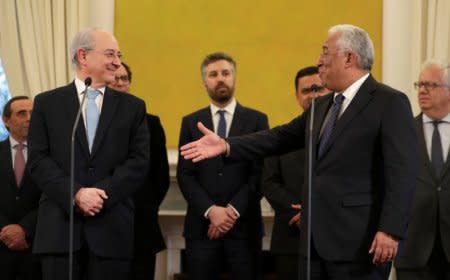Portugal government, opposition agree to cooperate after feud

Thomson Reuters
By Andrei Khalip
LISBON (Reuters) - Portugal's Socialist government and the main opposition Social Democrats agreed on Wednesday to cooperate on some reforms and funding plans, in a deal that may reduce the government's dependence on its hard-left allies.
Signed by Prime Minister Antonio Costa and Rui Rio, the leader of the Social Democratic Party (PSD), the pact ends the animosity that followed 2015's election and nudges the PSD closer to the center.
The agreement covers a reform intended to give more powers to municipalities, as well as a strategy to keep using European Union structural funds for development over the next 12 years, and the two leaders said they hoped to expand their cooperation.
"PSD is available for all the agreements that require a broad consensus for structural reforms to proceed," Rio said.
The center-left Socialists came to power in 2015 by striking an alliance with the two hard-left parties in parliament. That prevented the center-right PSD, who had won the most votes in the election, from forming a government.
Until Rio took over, the party had mostly confined itself to nay-saying and criticizing the government, despite its economic and fiscal accomplishments.
The administration has reversed most of the austerity measures adopted during Portugal's 2011-13 bailout. The country posted the lowest deficit in its democratic history in 2017 and the strongest growth rate since the turn of the century.
Costa said the new deal does not affect his arrangement with the left or change the PSD's opposition status. However, he said, it was "absolutely essential to have broad political agreements" for structural reforms and issues concerning development strategy, including EU funds.
But the eurosceptic Left Bloc and the Communists are critical of the government's new, lower budget deficit targets for the next few years. They have argued it should spend more on healthcare and government worker wages instead.
"Maybe the deal is not a message to the left as such ... but it consolidates the position of the Socialists as the axis of the political system," said political scientist Antonio Costa Pinto.
The Socialists lead in all opinion polls for next year's election, scoring close to 40 percent of voting intentions, with the PSD far behind on around 27 percent.
(Reporting By Andrei Khalip, editing by Larry King)
See Also:

 Yahoo News
Yahoo News 
